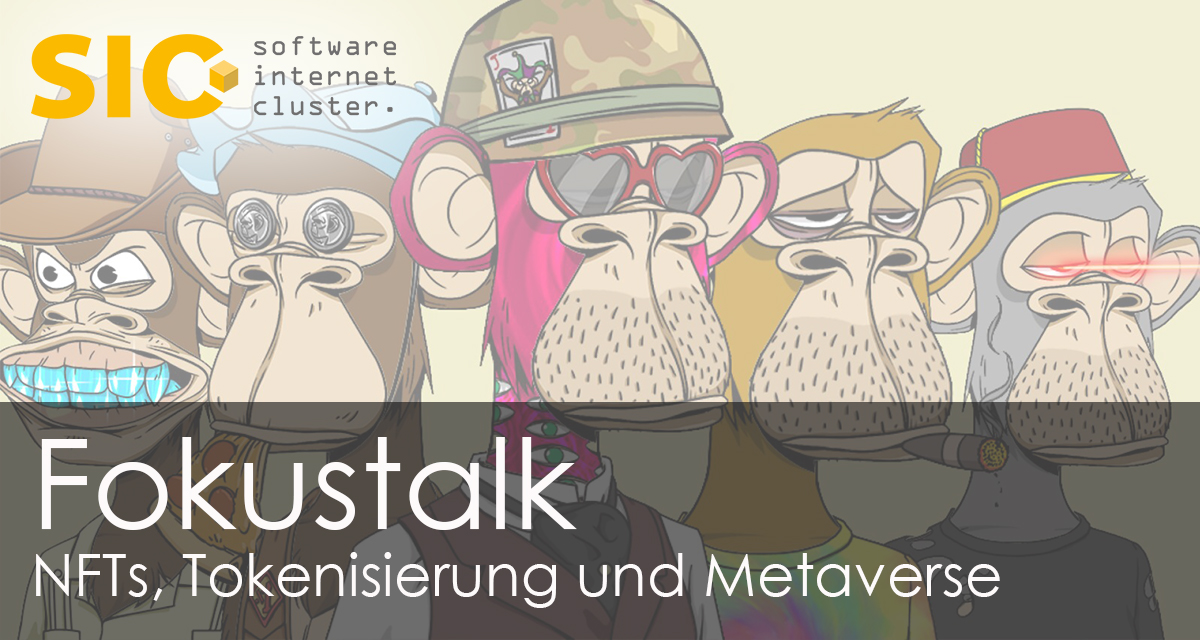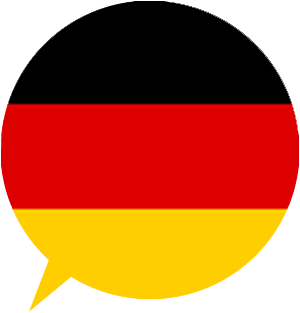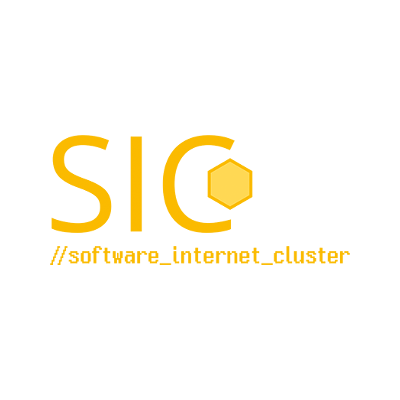The Software Internet Cluster held its 3rd focus talk on NFTs and blockchain applications on May 25th. As an initiative of the Digital Sales focus group, the aim was to create an overview of current application scenarios and future trends with practical experts in order to identify and implement opportunities in future business models in connection with new technologies.
Cutting-edge Applications of the Blockchain!
Especially in the software and IT industry, it is important to keep an eye on trends and future technologies. For our focus talk, we relied on top-class experts with different view points in order to illuminate the topic of NFTs from as many perspectives as possible. We gave an overview of current application models of NFTs in the corporate environment, highlighted milestones in the crypto area and blockchain applications, clarified the current status quo and gave an outlook on future use cases.
Missed our Focus Talk?
No problem, we got you covered. You can also find the recording of our focus talk with our experts in our Member Area.
Focustalk – NFT, Tokenization and Metaverse

DI Bernd Buchegger – Founder and Managing Director of trinitec IT Solutions & Consulting GmbH and Leader of our Focus Group Digital Sales
As an expert in digital sales, Bernd Buchegger deals with trends and innovations in Digital Sales and eCommerce and supports the implementation of professional automation solutions for digital business processes.
In order to create a common basis for our focus talk, Bernd Buchegger first clarified definitions and terms such as NON-FUNGIBLE vs. FUNGIBLE TOKENS with examples from the Bored Ape Yacht Club (BAYC), TOKENIZATION as security and refraction of assets via the blockchain, such as e.g. with SMART CONTRACTS or real estate investments with Brickwise, as well as the METAVERSE with digital spaces, avatars and marketplaces.

Dietmar Pogatschnig – Founder and Managing Director of dBIT GmbH & Co. KG in Carinthia
As a practice-oriented expert from the regional area, Dietmar Pogatschnig gave an overview of the first contact with NFTs in the corporate environment, how SMART CONTRACTS are used as an approach to protect assets (e.g. in ticket sales, car dealerships or real estate investments). The use of such technologies is also intended to counteract sales on the black market, since these transfers can be tracked and the organizers or creators can also benefit financially from this.
The regional expert also made it clear that we are only at the beginning of our journey with NFTs. There are currently only around 500,000 wallets that own NFTs so far. However, the areas of application of NFTs are almost limitless. From real estate, memberships, vouchers to proof of ownership and collector’s items, almost anything is possible with NFTs and the blockchain technology behind them. Added to this is the advantage of digital availability and protection against counterfeiting.
An application scenario for exclusive memberships was explained in more detail using the Bored Ape Yacht Club (BAYC) and, in addition to the conventional strategy of profiting by simply increasing value in NFT trading, ICE POKER, a decentralized poker platform in the Metaverse, was also presented as a use case for Play2Earn. Here, for example, in addition to normal NFT trading, NFTs can also be awarded to active players, in order to indirectly participate in profits.
In order to MINT NFTs at all, you need a so-called wallet (e.g. METAMASK) in which the NFTs are stored. OPENSEA is established as one of the most relevant platforms for trading and overview of NFTs. It is also advisable to look around on important platforms of the NFT community such as Twitter or Discord to get useful insights and information on new NFT projects.
As a columnist at t3n, Dennis mainly deals with problems and application scenarios of tokenization and which problems can actually be solved with this technology. In addition, our expert from Munich illustrated the evolution of blockchain technology and the phase we are currently in. The NFT boom has been apparent since 2018.
“Come to stay.”
Successful use cases for community building in the music scene include Royal.io and Ape-in-Productions – by Timbaland. Particular attention is paid to the investor opportunities through NFTs and the underlying blockchain technology, which supports artists through the marketing of music rights and fans can benefit from exclusive events and merchandise, as well as profit sharing such as through early-stage investments.
There are also exciting use cases for event ticketing and food tracing using NFTs. When buying event tickets, you usually have the problem that tickets for popular events are quickly sold out and you then go to the secondary market to get tickets there. NFTs give you a precise overview of how many tickets are still in circulation and how many are originals – Tracking and Proof of Origin. In addition, organizers also gain access to the secondary market and can benefit from resale and define a minimum and maximum price using Smart Contracts.
At the moment we are still in an exciting experimental and pioneering phase, where there is still no golden way to position yourself as a company in the best possible way. It is important to identify approaches for your own company, to deal with them and to implement them. In the future, however, FRACTIONAL, DYNAMIC and PHYSICAL NFTs will certainly occupy us even more closely.
Q&A Session
What does it mean to MINT an NFT?
NFT projects created by artists or organizations are published and offered on websites. Here you get the opportunity to buy or mint an NFT, connecting the wallet to the target website and transferring the NFT in exchange for crypto currency and making it visible in the wallet.
Sidenote: If you already own several or certain NFTs, you have the opportunity to be prioritized when buying NFTs and thus to rank ahead of other interested parties when buying, since only a limited number of NFTs is often offered.
Which browsers support the Metamask plugin?
Metamask is a hot wallet and browser add-on. The wallet can be installed as MetaMask Chrome, MetaMask Firefox, and for the Brave and Edge browsers.
What are FRACTIONAL, DYNAMIC, and PHYSICAL NFTs?
Fractionalized NFTs
Fractionalized NFTs are NFTs that form a total amount of an asset together with other NFTs. Under certain regulations, for example, shares of a product can be purchased using NFTs.
Dynamic NFTs
Dynamic means that attributes can be added or changed to existing NFTs. Thus, the traceability of assets, such as the last renovation of a property or information about previous owners of a car, can be created.
Physical NFTs
The digital twin approach of NFTs. A physical product can be purchased in connection with an NFT. The NFT ensures rightful possession without physically owning the product, such as paintings displayed in museums.
Are there any approaches for using Metamask on mobile devices?
There is already a mobile Metamask app for mobile devices. According to experts, this is still too cumbersome at the moment. You also want to keep points of attack on your own wallet as low as possible. But there will be a lot more offered in the future!
Are there alternatives to NFT platforms like OpenSea?
In addition to OpenSea as a platform for NFT trading, there are also Solanart, Magic Eden, Soulrare, and private NFC marketplaces, which are announced via Twitter or Discord.
What about security tokens such as Polymath?
Polymath provides technologies to create, issuance and manage security tokens on the blockchain. This can be used to issue tokens for participations. However, the problem here could be a regulatory and country-specific issue, although it is already allowed in Switzerland (CH). Security tokens are seen as securities and can stand for real estate, for example, and are therefore also considered collateral, such as for getting a loan.
Shitcoin / Scamcoin – How to recognize the dangers?
Scenario: Adidas had made an NFT available on their website, which was quickly sold out. Subsequently, the “Adidas-NFT” continued to be offered and sold via a fake websites.
Important: Is the website really structured according to the description? Inform yourself thoroughly and never give out passwords for your own wallet!
Which use cases could be possible for public processes or authorities?
Areas of application for certificates, purchase contracts or entire overviews of sales and delivery processes could be realized with Dynamic NFTs.
What is the Metaverse?
Metaverse is the merging of the real with the virtual world – this is still difficult to grasp at the moment and many people are still working on more precise definitions.
Status quo
Large labels are already showing their own business areas in the metaverse – but without currently active users. So the commercial idea is already very big, but often reduces the user experience at the same time. Dispite that, definitely an absolute sweet spot for the advertising industry. The gaming industry has been there for a very long time.
Outlook into the Future
Firstly real benefits and values have to be created in order to spend time in the Metaverse. The focus could rely on the immersive experience – AR Cloud, in particular, to promote the convergence of the virtual and physical world. However, this requires the necessary hardware, edge computing for real-time rendering, interoperability, etc. For this, fundamental standardization must first be created.





